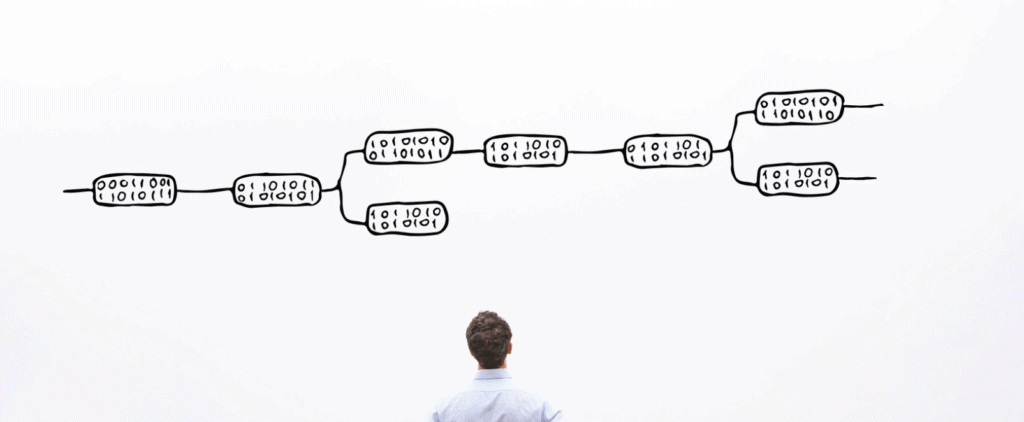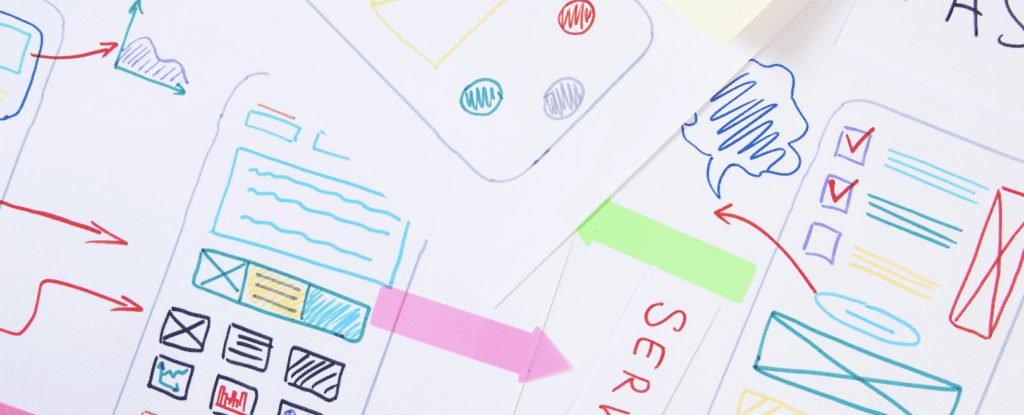Blockchain tech is like a magic key that could change the way businesses talk and people chat, laying down the bricks for a world that lives online. Imagine a place where everything you do is built on trust and security, kind of like having a superpower shield for your digital life. It’s for everyone who dreams of a future where dealings are transparent, and your info is safe and sound. Dive in, and you’ll discover secrets to making this tech work for you, not just a bunch of mumbo jumbo but real-deal tips. By the end, you’ll see why jumping on this digital train is not just smart, it’s essential for keeping up in our fast-moving world.
Blockchain is a distributed ledger technology that aims to prevent unauthorized access and guarantee that records are permanent (nothing can be erased once it’s recorded) and trackable without the need for central management.
Encrypted distributed databases are a type of architecture that enables various organizations to use one common database, which does not need human verification and is immune from unauthorized access.

Blockchain technology has shown its ability to manage data decentralized and secure, gathering multiple fragments into one whole. As a result, blockchain can efficiently transmit value across the internet, whether rights of ownership, goods, or services.
Blockchain Efficiency
Efficiency implies both the speed of information exchange on the blockchain and ensuring its reliability, immutability, and building a secure and transparent mode of access to this data by only those who have the right to access it.
When the costs of adding data sources and associated risks exceed the benefits, this is especially significant. In addition, with the incredible advancement in the deployment of consumer data in new industries, such as AI and IoT, customers are becoming increasingly concerned about visibility.
UX/UI Is Lacking Behind Blockchain Adaption
If the blockchain has achieved a critical level of maturation, the UX/UI technologies that work with it are still in their early stages. As a result, they will begin a quarrel that is eerily similar to the conflicts of the standards that have resulted in today’s Internet standards.

Customers’ sensitive personal data is expected to be soon safeguarded by licenses based on blockchain technology, according to experts.
How Blockchain Revolutionize Education?
Blockchain technology represents a potentially revolutionary approach for the verification of qualifications, certificates, and diplomas. The opportunities offered by this new method are partially due to the decentralized nature of the blockchain process; all information is distributed on many servers via peer-to-peer networks.

The digital revolution that has affected today’s society has made some frontiers fade, resulting in a generalized lack of trust from those who perceive that the institutions that manage the services they use are not as effective as they should be.
We expect that instances will increase as blockchain matures and gains more exposure. We advocate for the use of blockchain technology to allow us to authenticate any digital information.
Different university degrees may be authenticated by using blockchain technology. The immutability of this ledger will prevent qualifications from being falsified or forged and will avoid academic fraud and plagiarism.
This can also help reduce the time spent on the validation of diplomas and certificates by institutions such as universities and professional organizations.
How Can Blockchain Improve Education?
Students may not be able to show their talents and knowledge, which leads to difficulties in applying for work. They will be able to do this using blockchain by providing them with digital certificates that cannot be duplicated or falsified.
This represents a system that aims to verify qualifications without the need for data storage centers managed under general management systems, thus allowing users to decide what information they share about themselves.
It is not hard to imagine how blockchain allows us to decentralize title certification records, thus enabling all interested parties to view these records while also providing transparency around who made modifications or updates – perhaps even why they were updated.
We should not forget that another characteristic of blockchain technology is the possibility of building decentralized autonomous organizations (DAOs), which are programmed to perform tasks autonomously.
We must bear in mind that this technology is still currently under development, but it will allow anyone with appropriate devices and access to the Internet to gather information from repositories located anywhere in the world, using a decentralized network of sources that provide reliable data without recourse to any third party.
How Can Blockchain Technology Help In The Development Of A Healthy Lifestyle?
When we talk about a healthy lifestyle or eating habits, we refer to all those aspects linked to food, from production up until consumption.
In recent years there have been several initiatives related to the application of blockchain technology for improving agricultural processes and logistics management as well as certifying products.
These projects offer innovative solutions for the identification, verification, and tracking of products along the supply chain.

Blockchain technology is being applied in different ways to allow us to have a healthier lifestyle by providing access to information processed using cryptographic techniques that are immutable and transparent for all users, allowing anyone involved in the food industry to deal with problems arising from product counterfeiting or fraud.
As an example, IBM has implemented blockchain distributed ledger technology to track foodstuffs along the entire supply chain including parts used in its production (seafood), verifying their sources (fishing boat) as well as how they are processed (refrigerators).
With this kind of information at hand it will be possible to ensure compliance with government regulations regarding illicit substances such as mercury residues; although many consumers can also take advantage of this information to make decisions about the food they eat.
The application of blockchain technology for recordkeeping is not limited to agricultural products, it can also be used in all other areas where activities related to food are carried out.
This ledger offers opportunities for improving processes and reducing costs associated with logistics management as well as maintaining records that are accurate and easy to access despite being present in various databases across the globe.
These characteristics allow us to consider how different companies involved in this industry may use blockchain technology to optimize their workflow by avoiding unnecessary steps or duplicating tasks carried out now by two or more parties.
In addition, it would also simplify operations such as payments or refunds since they could be processed automatically using cryptocurrencies.
In conclusion, blockchain technology is revolutionizing the way business is conducted not only in this sector but also improving many others thanks to its characteristics of decentralization, immutability and transparency.
How Does Blockchain Revolutionize?
Since Satoshi Nakamoto published the Bitcoin white paper in 2008 to the present day, blockchain technology has evolved & disrupted multiple industries.
Blockchain technology is a decentralized digital ledger that chronologically records transactions so that everyone can see what’s going on.
What Is a Digital Ledger?
A digital ledger records financial transactions in chronological order allowing all users to have up-to-date information about their balances.
Blockchain networks are inherently resistant to modification of the data since it requires a consensus of the majority of participants in the system or else one would need to alter all subsequent blocks which are being simultaneously modified by each node when they are added to the chain.
Why We Need Decentralization?
When you enter your credit card information online, you are entrusting that the information you submit will only go to who you are attempting to send it to.
This is fine in most cases but not when we’re talking about financial transactions between two parties where there is no third party, like banks, present.
Why We Need Transparency?
The most important benefit of blockchain technology is transparency because it allows anyone with internet access to check what’s going on in the network.
Most companies value their customers and keep them informed about their actions by publishing press releases or statements on their websites; however, this does not happen in practice for many reasons.
Blockchain prevents this from happening because all account balances & transactions are public information allowing all users to see what is actually happening with their money or assets.
How Does Blockchain Technology Work?
Blockchain technology is a decentralized digital ledger that chronologically records transactions so that everyone can see what’s going on. There are 3 types of participants in the system:
- Users: Individuals who use applications and access network resources and services
- Nodes: Consist of users computers connected to the P2P network via a client application that validates & relays transactions while receiving a copy of the full blockchain
- Miners: Users who provide processing power to verify transaction blocks and receive rewards for their participation in the system (Bitcoin, Litecoin, Dogecoin, etc.)
Why Is Blockchain so Slow?
Many using Ethereum will discover that the network is congested. The answer is that when a blockchain network experiences peak traffic, it causes delays, a backlog of transactions, and thus higher transaction costs.
Even if you charge a reasonable fee, you might be waiting for a long time.
Blockchain Revolutionize Mortgage Industry
A mortgage is a financial instrument that allows an individual to borrow money against the collateral of real estate. Mortgages are intended to finance various types of housing including apartments, houses, or even in some cases commercial properties.
Unfortunately, blockchain revolutionized mortgage industry has not come… Yet!
Nevertheless, blockchain enables faster & easier steps than traditional methods such as title transfer and registration which can take weeks.
Also, smart contracts enable automatic payments at certain milestones which dramatically reduces default risk by eliminating human errors during calculations.
What Can Blockchain Do for You?
Blockchain technology will probably affect you in one way or another even if you don’t know it yet because it is disrupting multiple industries that span from healthcare to transportation.
The major advantages of blockchain technology are transparency, immutability, and security making it a disruptive force that will change the way business is conducted.
Blockchain has a lot to offer for both users & companies by simplifying processes and decreasing transaction costs which can be transferred back to you as savings or lower fees.
Blockchain networks provide more enhanced features than traditional tools such as smart contracts that enable automatic transactions, cryptocurrencies, instant communication with customers, increased control over funds by eliminating middlemen/third-party services like banks, etc.
The bottom line is that blockchain does more than simply transfer data between two parties but also enables transparency, trustworthiness, and efficiency.
Blockchain Will Revolutionize the World
Blockchain technology is revolutionizing the world by providing a way of conducting business that is more efficient, transparent, and secure. Utilizing a decentralized digital ledger, blockchain technology eliminates the need for intermediaries and allows for faster and direct transactions. Additionally, the use of cryptographic algorithms ensures the integrity and security of the data, making it nearly impossible for tampering or fraud. Blockchain data structure explained plays a crucial role in how information is stored and accessed within the network. This innovative system organizes data into blocks that are linked together, creating a chain that is resistant to modification.
In addition to its impact on the business world, blockchain is also having a positive impact on other industries thanks to its characteristics of decentralization, immutability, and transparency.
Conclusion
In a nutshell, blockchain is a technology that allows businesses to conduct transactions more efficiently, transparently, and securely. In addition to its impact on the business world, blockchain is also having a positive impact on other industries due to its characteristics of decentralization, immutability, and transparency.
Blockchain FAQ
What Is Blockchain Technology?
A blockchain is a public ledger of all Bitcoin transactions that have ever been executed. It’s constantly growing as ‘completed’ blocks are added to it with a new set of recordings.
The blocks are added to the blockchain in a linear, chronological order through cryptography, ensuring they remain beyond the power of manipulators.
What Is a Digital Wallet?
A wallet is basically a collection of private keys that allows someone to spend the bitcoins allocated to it in the blockchain. In simpler terms, if you have bitcoins, this is akin to having something with a combination lock on it.
No one can open your box without knowing the code, and only you (or whoever has the private key) can send money from it. It’s like having a Swiss bank account in your back pocket!
How Are Transactions Verified?
New transactions are constantly being broadcast to all nodes across the network, and miners (particular nodes) put them together into blocks which they then attempt to solve.
The first miner to successfully solve this puzzle adds the block to their copy of the blockchain and claims their reward (some token or coins).
All nodes on the network validate each transaction block before it gets added, but miners get a special privilege: They can choose which transactions in that block they would like to verify & ignore all others for faster processing.
Because of this power, miners can control who transacts with whom by choosing whether or not certain addresses will be included in blocks they mine; however, everyone still has an equal say in making the network run.
What Is Mining?
Mining is basically a record-keeping service with several simultaneous users called ‘forks,’ in bitcoin’s case. Forks happen when two blocks containing valid transactions appear at the same time.
The fork that gets accepted into the chain becomes part of the permanent database in that everyone can see it in plain text forevermore, while the other fork gets ignored by everyone on the network for being an orphan block. Miners get rewarded for keeping things running smoothly & verifying blocks of transactions.
How Do Transactions Work?
Transactions get submitted when using wallets that generate two mathematically linked keys (public and private), known as a key pair.
A transaction is then sent to the network where miners verify the transaction (the bank is stripped out of this process by design). After verification, these transactions are checked against the blockchain to ensure funds are being spent properly.
What Are Bitcoins?
Bitcoins are digital coins you can send through the Internet. In some circles, these are known as cryptocurrencies. They’re kept in an electronic wallet and consist of a string of characters.
You can buy products and services by sending them to others or storing them away for later use (saving).









